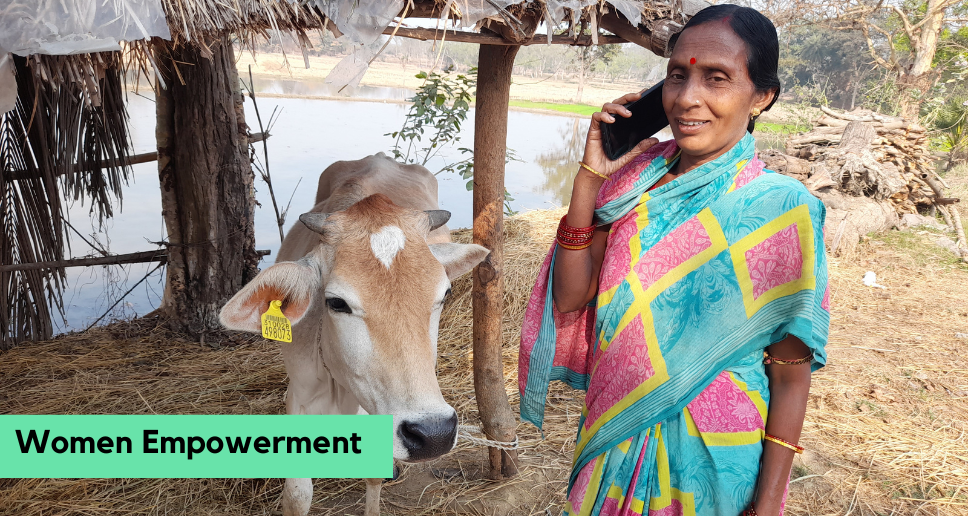Milk Matters: Enabling women’s agency through better livestock management
Bargarh district, Odisha
Stepping nimbly over hay and fodder, Basanti Pradhan looks proudly at the cows in her backyard. It had taken her a few weeks to nurse them to good health, but now she knew that they were happier and healthier. A few months ago, Basanti has seen the cows Goria and Dhabli that she cared for so carefully, struggle with disease, poor nutrition in spite of everything she did. Distressed, though she was unwilling to give up on them, it seemed there was no other option ahead.

This was July 2022 – when the south-west monsoon had set in across India and her and her family’s attention was also required for preparatory work for their two-acre farmland where they usually grow paddy during kharif and rabi seasons, besides vegetables.
While the farmland was primarily managed by her husband, Basanti was worried about the cattle that she considered an extension of her own five-member family.
Gaisima village under Bargarh block, Bargarh district, Odisha boasts adequate irrigation from the Mahanadi river-sourced canal water, to support paddy as the major crop. Basanti’s husband owns the family’s agricultural land.
In spite of being engaged actively in India’s rural workforce, women’s land ownership has remained low; in which context their sense of ownership or self-identification as farmers is still much lower than for men. The rapidly growing livestock sector in India, accounted for about 5% of national income and 28% of agricultural GDP in 2018-19, growing nearly four times faster than crop farming over recent years. However, in the case of livestock farming, for over 5.4 million Indian women, at the forefront of India’s milk revolution, indeed, managing livestock has given them agency, economic empowerment and a definition of independence. Women constitute about 69% of workforce engaged in livestock sector while in states like Jharkhand, Chhattisgarh, Odisha, women form upto 90% of the livestock sector workforce.
What women do need, however is support to enable and empower them towards the economic independence that livestock can provide. This is exactly what Basanti needed too. For her, timely advice came through the reference of her own cooperative, the lofty sounding Baba Balunkeswar Co-operative Women Milk Society named after the ancient Lord Shiva temple in the village.
Basanti sat down to attend an audio conference, that was organised by Reliance Foundation, through her society members. This was her first experience listening to an interesting conversation where experts directly advised farmers with scientific solutions during the conference. During this time, she learnt many interesting things. She heard about nuances of animal health, timely vaccination and the cow hoof disease that had affected her own cattle. She learnt how she could manage them much better – hearing directly from accurate scientific information, in a simple manner that was easy for her to access in her neighbourhood.
Theory was followed by practice as three months later, she also participated in a livestock treatment camp organised by Reliance Foundation, where she got free medication, vaccination and tonics for her two cows and a calf.
The approach was scientific, the diagnosis was quick, and most of all, the solution was simple enough for Basanti to tend to her cattle on her own.
Within 30 days she could see a significant difference. Rid of the disease, the cattle responded well to the fodder and so their milk production increased as well. Within six months the milk production from her cows has nearly doubled. She now struts around proudly among her cows, they equally spirited.
“My highest level of formal education was Grade III at school”, she laughs, “now ask me about scientific cattle management practices, I can tell you a thing or two. Most of all, I feel self-reliant, stronger as a person and within my family as well. They have seen the difference and they think much more of my personal opinion now.”
Mobile phone in hand, Basanti absently strokes Goria as it moos affectionately. It was not just the cow that had found its voice. Through Reliance Foundation, Basanti found that bit of empowerment, her identity and also found her voice as a person, as an empowered rural Indian woman.
Reliance Foundation has been working with over 66 million most-at-need communities across India since 2010, with a mission to build a more inclusive nation.
Read more about our work on Women Empowerment here.
Read more stories



